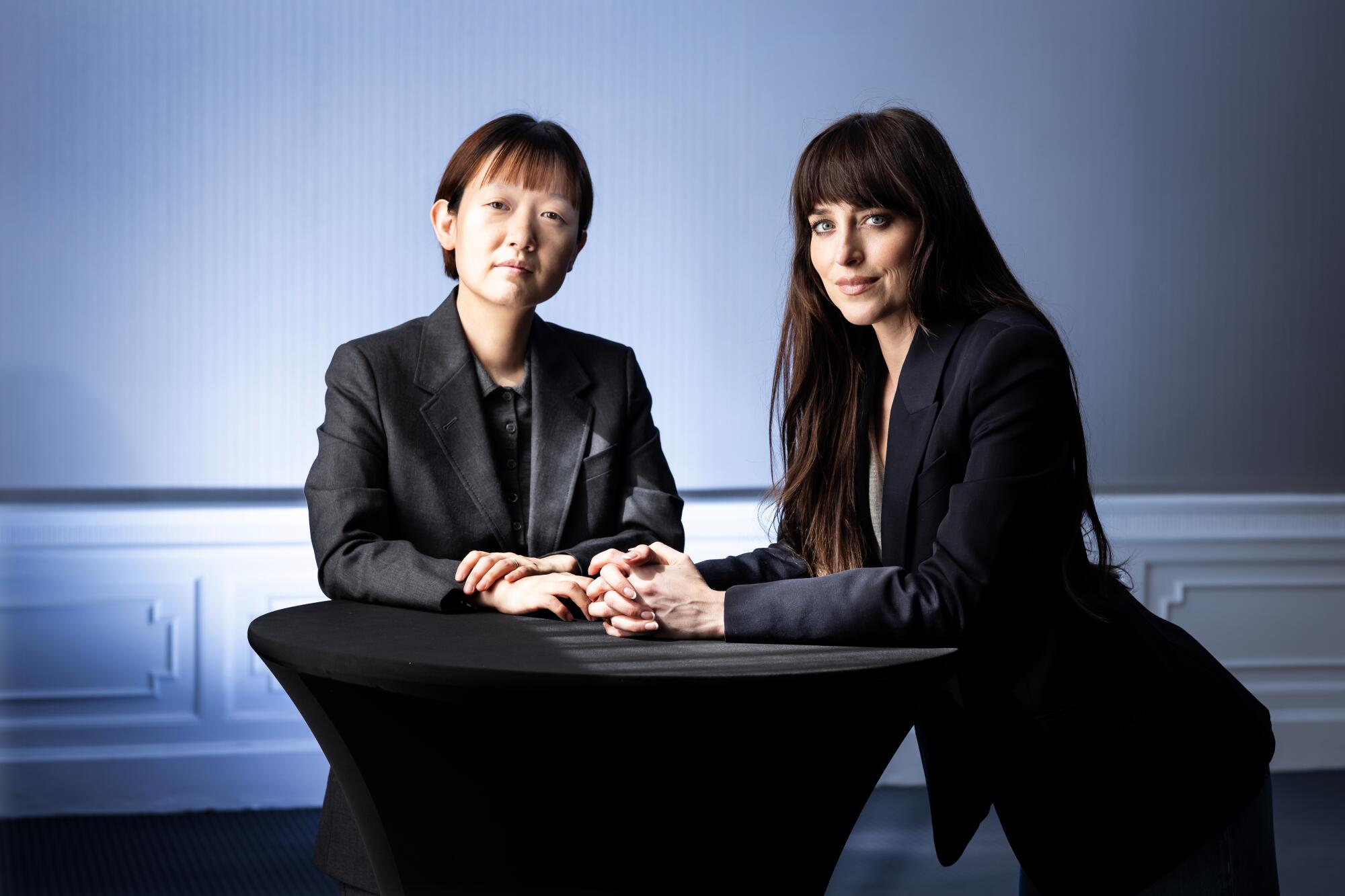
- Share via
The new film “Materialists” is something of a bargain: essentially two films in one. It’s very much a sparkling romantic comedy in which a young woman finds herself torn between a wealthy man who can offer her a life of comfort and ease versus another much poorer man who nonetheless understands the deepest, truest parts of her inner self.
It is also filled with long, thoughtful conversations on the very nature of why love and relationships matter so much, the parts they play in people’s lives and effects on an individual’s sense of identity. The movie is both a thing and spends a lot of time considering the nature of that very thing, almost an essay about itself. And it does so with a stylish, romantic sophistication and ease.
Written and directed by playwright turned filmmaker Celine Song, “Materialists” (in theaters June 13) is the follow-up to the wistfully melancholic “Past Lives,” her 2023 feature debut that was nominated for best picture and original screenplay Oscars. The new film is in conversation with classic rom-coms by the likes of Nora Ephron, James L. Brooks and Billy Wilder, while also grappling with of-the-moment concerns such as ambition and achievement.
“We’re not just showing up here to be in love and beautiful and get to be in a rom-com,” says Song. “We’re also going to take this opportunity to talk about something. Because that’s the power of the genre. Our favorite rom-coms are the ones where we get to start a conversation about something.”
The season looks strong, loaded with the kind of big Hollywood swings, smart indie alternatives and a fair amount of delicious-looking dumb, necessary in every summer diet.
Song, 36, is sipping tea at a sunny corner table in the restaurant of a West Hollywood hotel along alongside the film’s star, Dakota Johnson. In the film Johnson plays Lucy, who works as a professional matchmaker in New York City, helping affluent clients fulfill their impossible criteria of looks, physique, occupation, education, income, background, lifestyle and anything else that might impact a prospective partner’s value in the marketplace of eligible singles.
When Lucy meets Harry (Pedro Pascal), a tall, handsome and very wealthy private equity manager, she initially tries to wrangle him as a possible match for any of the many female clients who would want him. But he plans to pursue Lucy instead across a series of impressively expensive dinners. Meanwhile, Lucy has also reconnected with John (Chris Evans), a former boyfriend who is still a struggling actor making ends meet as a cater waiter years after they broke up. Lucy finds herself torn between the cynicism and mathematical practicality her job has hardened in her and a yearning romanticism she wishes she could be open to.
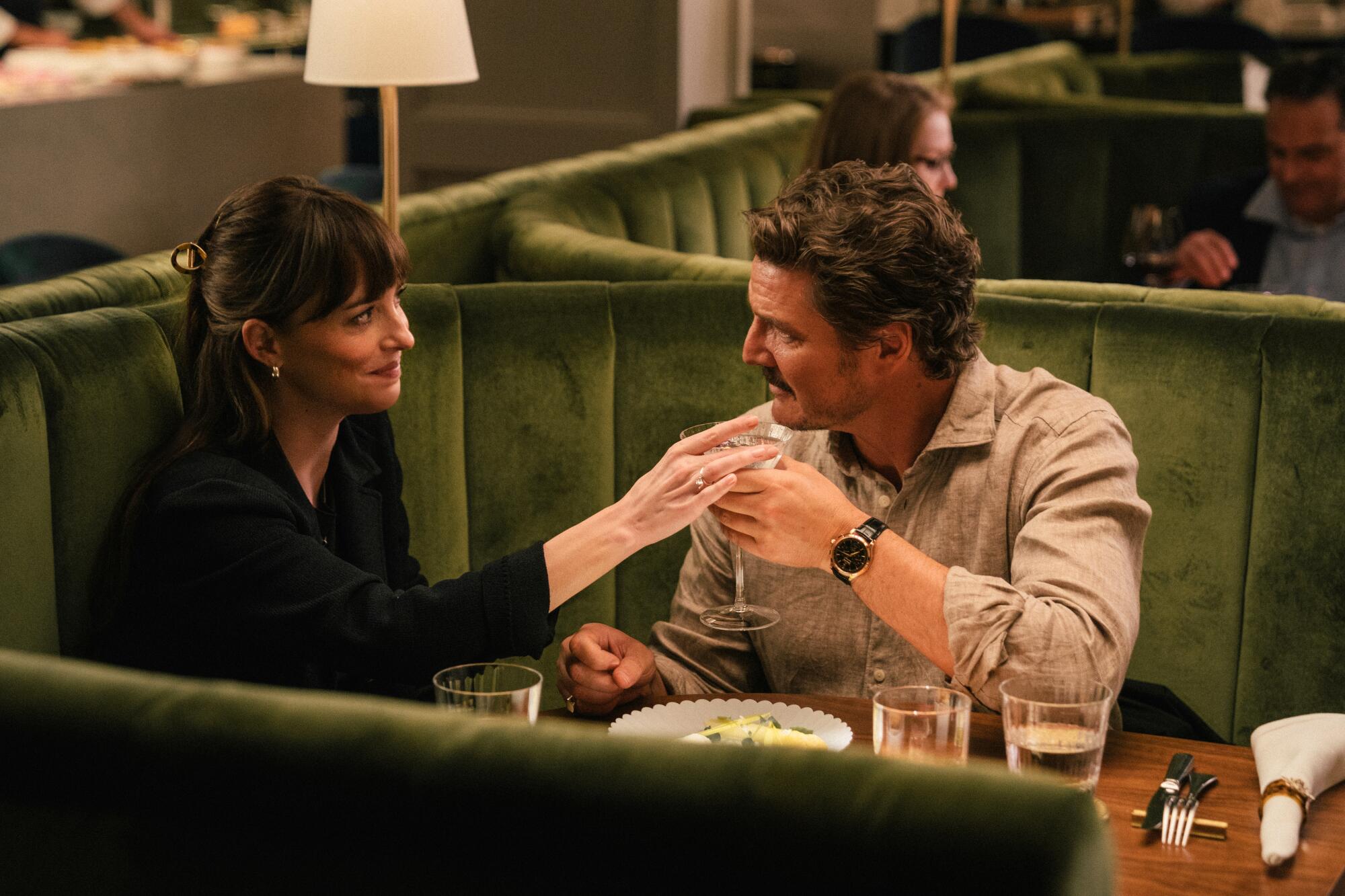
Depending on how one finds the erotic absurdities of the young-woman-in-the-big-city storylines of the “Fifty Shades” films that rocketed her to stardom, Johnson has rarely done a conventional rom-com (there’s only 2016’s “How to Be Single”). Which is not to say she hasn’t been offered such vehicles. She’s just declined to be in them.
“They’re not good,” Johnson, 35, says, chuckling lightly at her own bluntness. “Sorry.”
“I think a lot of what I read these days is void of soul and heart,” she continues. “And Celine is all soul and heart. I really love a rom-com if it feels like I can connect to the people in it. And I think I’ve found it hard to connect to the people in some of the ones that I’ve been offered.”
What made “Materialists” feel different for her?
“The complexities of all of the characters,” Johnson answers. “The paradox. Everyone being confused about what the f— they’re supposed to do with their hearts. And what’s the right move? I found that very honest and I found it just so relatable.”
Johnson, who is in a relationship with musician Chris Martin, continues, “For a long time we’ve all been so quick to judge relationships or how they should happen, how they should exist in the world. When people should get married. Divorce is bad. All these things that actually, if you think about it, why is divorce bad? Why do people have to get married or at a certain age or only once? Why? It doesn’t matter.”
First thoughts for the project began around 10 years ago, when Song worked for a professional matchmaking service for about six months. It’s very much a client-facing job, and she found the interactions she had with people to be bracing in their candor and vulnerability, as well as the ways in which the work demanded management of people’s feelings of desirability or lovability — as well as rejection or worthlessness.
“To a matchmaker, everybody’s very honest about what they’re looking for,” says Song, herself married to “Challengers” and “Queer” screenwriter Justin Kuritzkes. “Even at that time, I always thought, I just know I’m going to write something about it.”
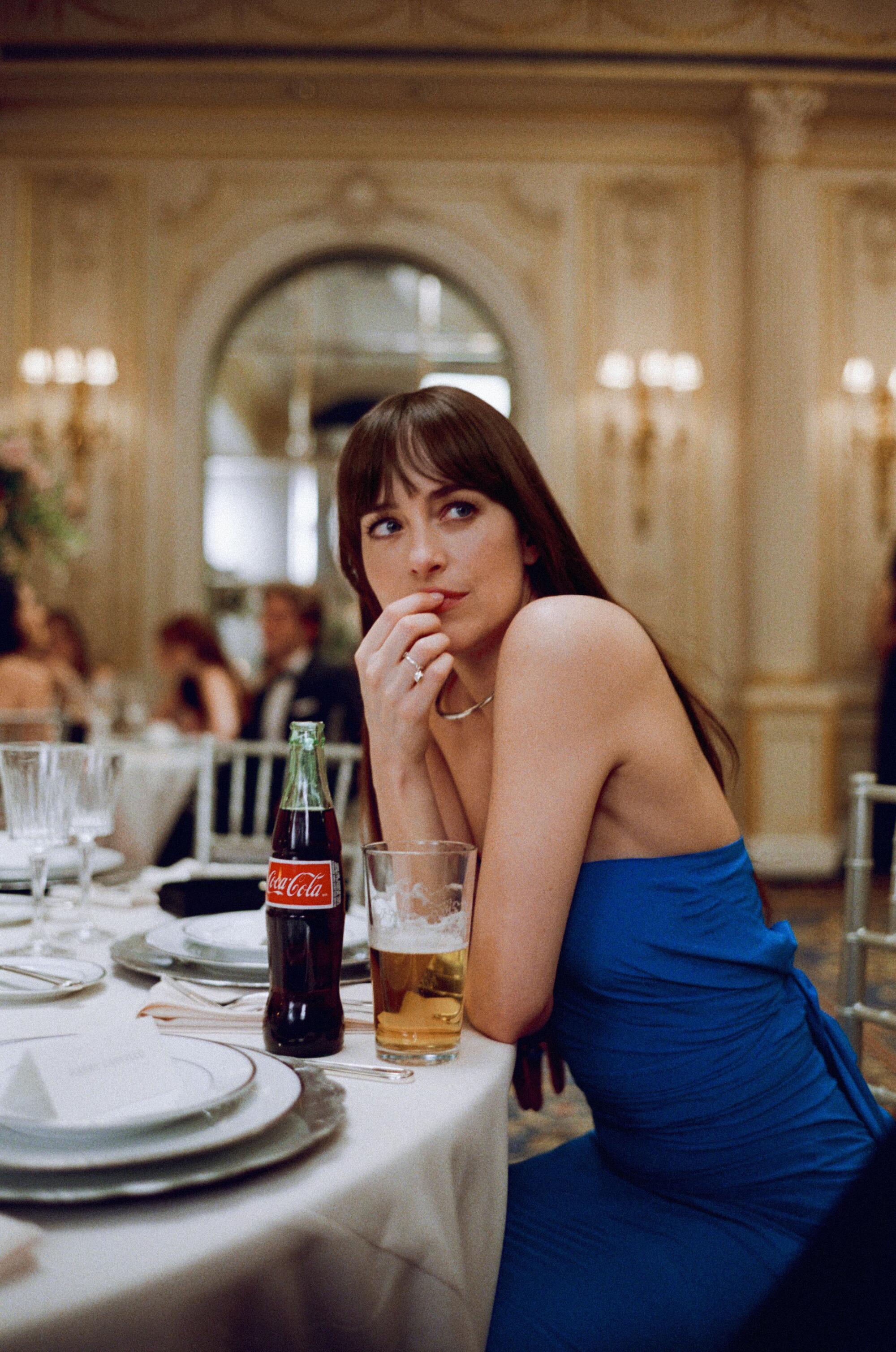
Ever since the film’s first trailer dropped, people online have commented on an unusual drink order placed by Lucy. More specifically, a drink that is placed in front of her before she really even has a chance to order it, by someone who already knows that her preferred beverage was once, indeed, Coke and beer, with space left in a glass to pour the two together.
“To me what was important is that this was a drink that is so strange that you can’t guess,” explains Song. “And that only somebody who knows you very well, who knew you in college, who knew you when you were really just at your heart your pure self, [knows] your drink order. So all I did was I Googled ‘weird drinks.’”
Though the drink is apparently popular in Germany, as for how it actually tastes, Johnson notes, “It’s just very effervescent and kind of gross. Not for me.”
Song and Johnson have formed an apparent bond in the time spent working together. (They met during a period when the attention around “Past Lives” meant that Song could get general meetings, not even for a specific project, with many top stars.) They both mention how by the time they were shooting, Song could often communicate ideas to Johnson with just a look or a gesture rather than an involved explanation.
“She’d come in and be like, ‘Um ...’ and I’d be like, ‘Yes,’” says Johnson.
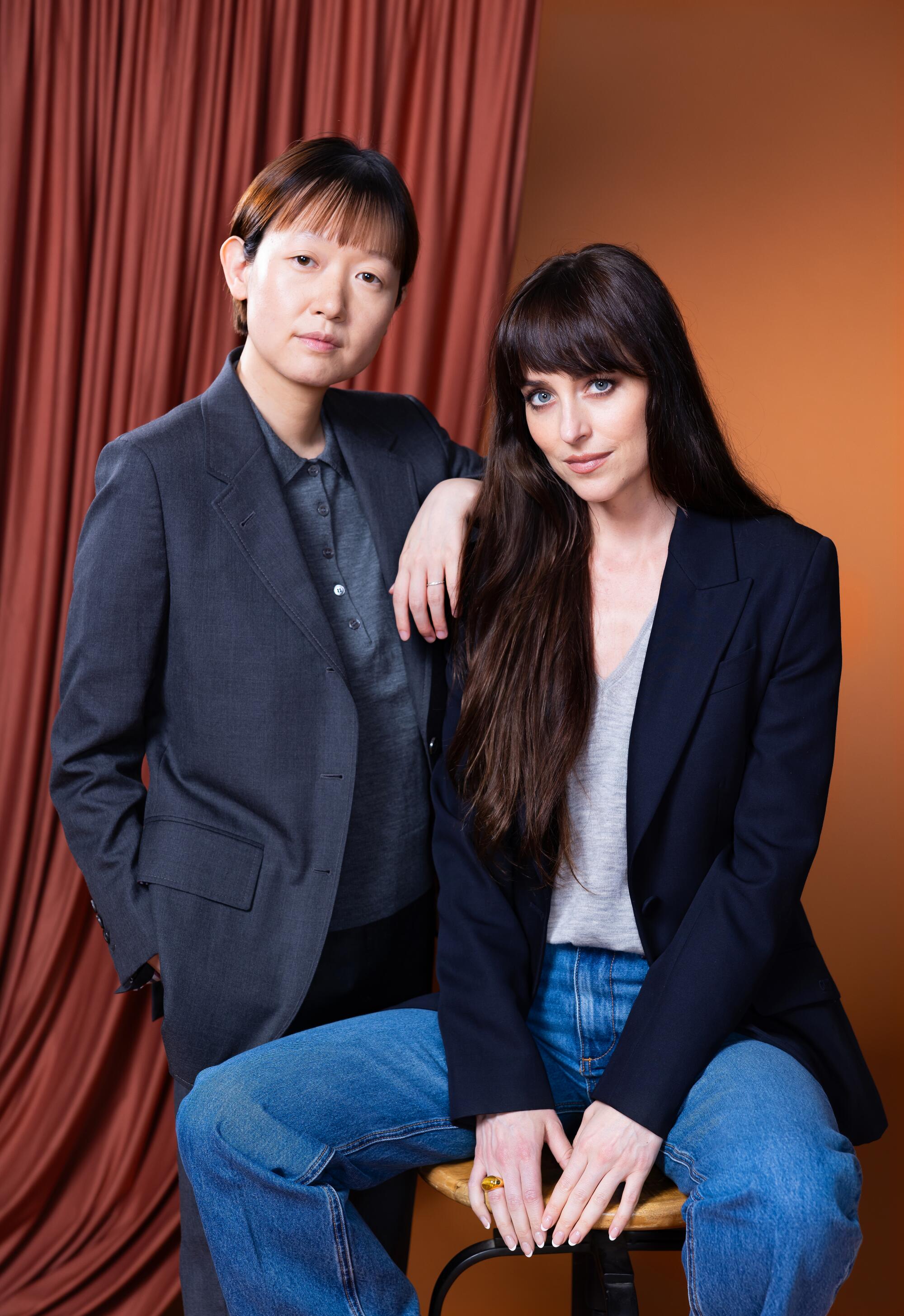
Johnson in particular has the unbothered savvy of someone who has spent their entire life in some proximity to the spotlight (her parents are actors Melanie Griffith and Don Johnson) and has now been steadily working since appearing in “The Social Network” in 2010. In conversation, Johnson and Song share a casual, relaxed energy between them. Yet at the mere mention of “Madame Web,” the 2024 Marvel adaptation starring Johnson that was a box-office bomb and subject of intense media scrutiny, Johnson’s eyes narrow and her posture tightens.
“Go on,” Johnson says with a feigned seriousness.
Will Johnson now stick to indie films at the scale of “Materialists” or the projects produced by her company TeaTime Pictures, such as 2023’s “Daddio” or the upcoming “Splitsville,” which recently premiered at the Cannes Film Festival?
“It wasn’t my fault,” Johnson says, laughing slightly while maintaining her focus.
“There’s this thing that happens now where a lot of creative decisions are made by committee. Or made by people who don’t have a creative bone in their body. And it’s really hard to make art that way. Or to make something entertaining that way. And I think unfortunately with ‘Madame Web,’ it started out as something and turned into something else. And I was just sort of along for the ride at that point. But that happens. Bigger-budget movies fail all the time.
“I don’t have a Band-Aid over it,” she adds. “There’s no part of me that’s like, ‘Oh, I’ll never do that again’ to anything. I’ve done even tiny movies that didn’t do well. Who cares?”
Having now been an active producer on a number of projects — including one to be directed by 93-year-old comedy legend Elaine May that Johnson says she hopes could be shooting in the fall — has made it different for her when, on a film like “Materialists,” she is an actor only.
“I think that sometimes I’m like, ‘Oh, I know how to fix it,’ or I know what to do, I want to help,” says Johnson. “And there’s some things where I have to just not say things. Sometimes I love just showing up, especially on our movie, it was just so much fun for me to only be acting. Because I was in so much of it, I felt like I was in such good hands, I could just relax into that role.”
The film uses a fable-like framing story about two prehistoric cave dwellers who may very well be the first married couple. (They also pop up for sharp-eyed viewers in another scene as well.)
“To me, the whole movie is in those pieces,” says Song. “Because all of what we are living through is also going to be ancient too. We know that certain stone tools were passed over to the other, but we do not know about the flowers that were exchanged. Because there are some things like sentiment and feeling and love that are intangible and ephemeral. There’s a very real and tangible and material record of stone tools and things being traded. But what passed between them in their heart is not. It’s not on record.”
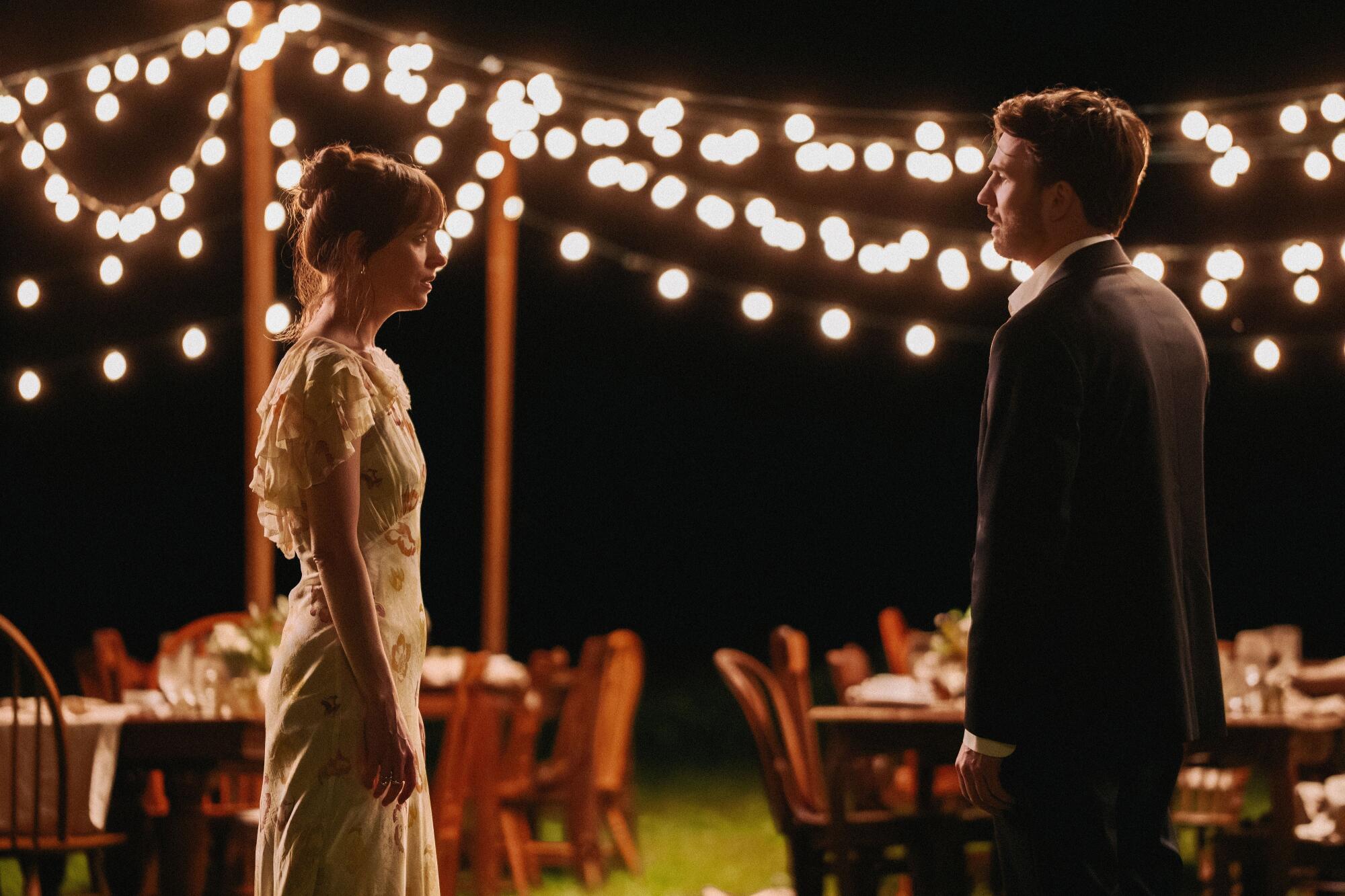
Leaping forward in time to depict contemporary worries and desires, “Materialists” attempts to capture the specifics of a cultural moment, calculating cost-benefit analysis against a perceived ticking clock while also often dodging abusive predators.
“In present time, the dating world because of social media is so different — everything is aspirational,” says Johnson. “You want to live the life that all these other people have on your phone, thinking that that’s what you’re supposed to be doing. It looks good, but it’s not authentic because it’s manufactured, it’s filtered, it’s ridiculous. So everything that a woman or a man is looking for in a partner, when they get to a certain age, whenever that is, it’s all material things. It’s height, it’s income, it’s hair, body, physique. It’s things that have nothing to do with a soul connection.”
Unafraid to grapple with tough conversations and moments of internal crisis, “Materialists” exudes a chic glamour as it interrogates the tough choices, motivations and consequences of modern romance.
At one point in the film, Lucy and Harry go to see John perform in a way-off-Broadway production of Song’s play “Tom & Eliza.” (Song’s name appears onscreen on a poster.) At drinks after, John says something dismissive about Lucy’s work as a matchmaker and she sarcastically retorts that it’s just “girl s—.” This line was Song’s own purposeful rebuke of the dismissive attitudes toward writing about love.
“I so often experience a general sentiment that love as a topic of conversation and study is dismissable as unserious, unimportant, ‘lighter fare,’ ‘girl s—,’” writes Song in a follow-up email. “People call romantic films ‘chick flicks’ as a way to diminish them, which I find unspeakably sad, not just for the way it excludes ‘chicks’ from the realm of ‘serious people,’ but also for the way it excludes ‘serious people’ from the realm of romance and love.
“That line of Lucy’s is intended to be a sharp reproach of that dismissal,” adds Song. “I believe that love is the greatest mystery in everyone’s lives, and therefore it is one of the most important themes in cinema. Love is the one drama we all experience, and it deserves the utmost respect.”
More to Read
Only good movies
Get the Indie Focus newsletter, Mark Olsen's weekly guide to the world of cinema.
You may occasionally receive promotional content from the Los Angeles Times.











